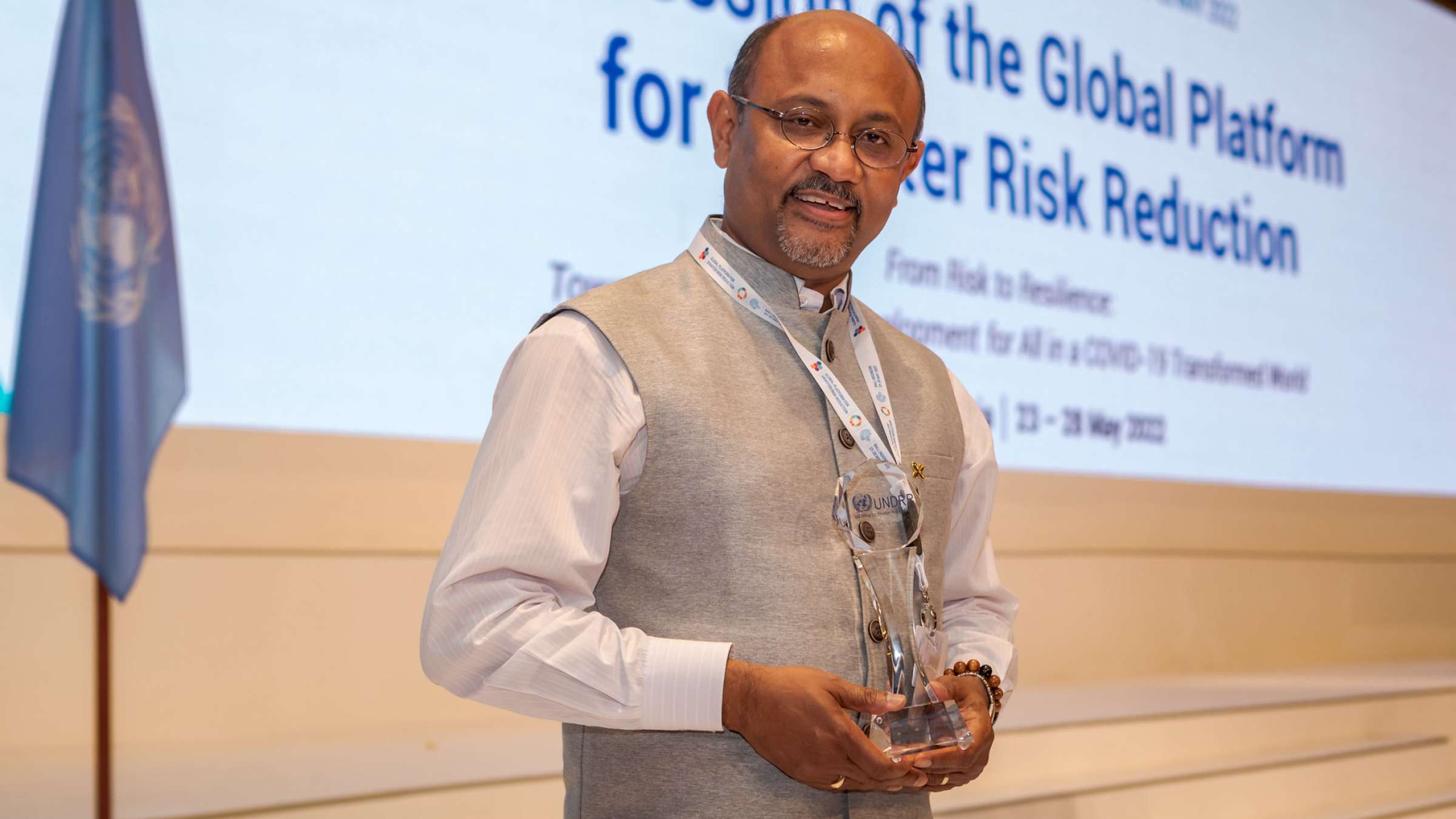2022 Sasakawa Award winners promote inclusion and protection of vulnerable people

GENEVA, 26 May 2022 – Three individuals – Myriam Urzúa Venegas, Rajib Shaw and Glenn Suerte Felipe Banaguas – and three organizations – the Pacific Disaster Center, Save the Children Philippines, and SEEDS – are the six laureates of the 2022 United Nations Sasakawa Award for Disaster Risk Reduction. They have been recognized for initiatives which protect vulnerable communities from disaster risk.
The winners were announced yesterday by Ricardo Mena, Director of the United Nations Office for Disaster Risk Reduction (UNDRR), and Masato Seko, Senior Program Director of the Global Issues Department of the Nippon Foundation, in Bali, Indonesia, during the Global Platform for Disaster Risk Reduction convened by UNDRR.
The Sasakawa Award for Disaster Risk Reduction focuses on the promotion of inclusive and resilient approaches in disaster risk reduction, reflecting the centrality of inclusiveness and resilience in the Sendai Framework. The 2022 Sasakawa Award honours practices and efforts made by institutions, individuals and groups that have best contributed to building resilience through a multi-hazard approach.
“A key tenet of UNDRR’s work is inclusivity. The Sendai Framework calls for inclusive disaster risk reduction to be integrated into planning, policy and funding. Unless we invest in prevention and building resilience, we will not be able to stop the spiral of disaster-response-recovery,” said Ricardo Mena, Director, UNDRR.
A record number of over 200 nominations from all regions were submitted for the 2022 Sasakawa Award.
“All nominees had demonstrated great contributions, achievements and efforts towards a sustainable commitment for Disaster Risk Reduction and Covid-19 recovery. We can clearly see the impressive life practices from all the nominees, missions, and projects, all being immensely relevant yet at the same time grounded,” commented Nuraini Rahma Hanifa, Sasakawa Award Jury Member, researcher at the Indonesian National Research and Innovation Agency, and U-INSPIRE Alliance Secretary-General.
Three prizes were awarded in the “Individuals” category:
First Prize: Myriam Urzúa Venegas, Secretary for the Secretariat of Integrated Risks Management and Civil Protection of Mexico City, Mexico
Myriam has been closely engaged in the “Making Cities Resilient 2030" (MCR2030) promoted by UNDRR. She has coordinated a training program to improve urban and environmental management in Latin America and the Caribbean. Her work gives public officials insight into sustainable development, environmental governance, and indicators which improve the resources available to governments.
Second Prize: Rajib Shaw, Professor at the Graduate School of Media and Governance, Keio University, Japan
As a professor in Keio University, Rajib Shaw teaches and carries out research in the field of disaster risk reduction and climate change adaptation. Rajib also chairs the Asia Pacific Science Technology Advisory Group (AP-STAG) and holds several honorary titles on the boards of Japanese NGOs. He has championed multi-hazard community-based disaster risk reduction in six Asian countries, and his work has led to the establishment of village-level community-based working groups.
Third Prize: Glenn Suerte Felipe Banaguas, Founder and President of the Environmental and Climate Change Research Institute (ECCRI), Philippines
Glenn is a scientist, a science diplomat, and an expert in the areas of environment, climate change and disaster risks. He has created a “Climate Smart” program to support vulnerable communities in the ASEAN region in building resilience and adapting to the climate change through sustainable practices.
Three prizes were awarded in the “Organizations” category:
First Prize: Pacific Disaster Center, United States
The Pacific Disaster Center (PDC) provides reliable information, research, applied scientific practices, and a disaster risk intelligence platform, DisasterAWARE, to empower disaster management decision makers and the public. PDC supports disaster mitigation, preparedness, response, and recovery worldwide.
Second Prize: Save the Children Philippines, Philippines
Save the Children Philippines works with the government to develop policies, plans and budgets, to ensure that children, especially those living in poor communities, have access to quality basic services and their rights protected. Save the Children Philippines also created the Rapid Assessment of Damages Report (RADaR) Mobile App – a reporting mechanism which assesses the needs of schools and their personnel and learners after an emergency or disaster.
Third Prize: SEEDS, India
SEEDS (the Sustainable Environment and Ecological Development Society) has been working with communities across South Asia for 28 years to build resilience by combining local wisdom with modern science and technology and multi-hazard approach. SEEDS focuses on vulnerable communities, amplifying their voices to policy makers.
The United Nations Sasakawa Award for Disaster Risk Reduction was created more than 30 years ago and is jointly organized by the United Nations Office for Disaster Risk Reduction and the Nippon Foundation.
For more information or for interview requests, contact: the UNDRR Media Team: Omar Amach ([email protected]) and Rosalind Cook ([email protected]).
About UNDRR
The UNDRR is the focal point for disaster risk reduction within the UN system. It oversees the implementation of the Sendai Framework for Disaster Risk Reduction 2015-2030 and convenes and organizes the Global Platforms for Disaster Risk Reduction.
